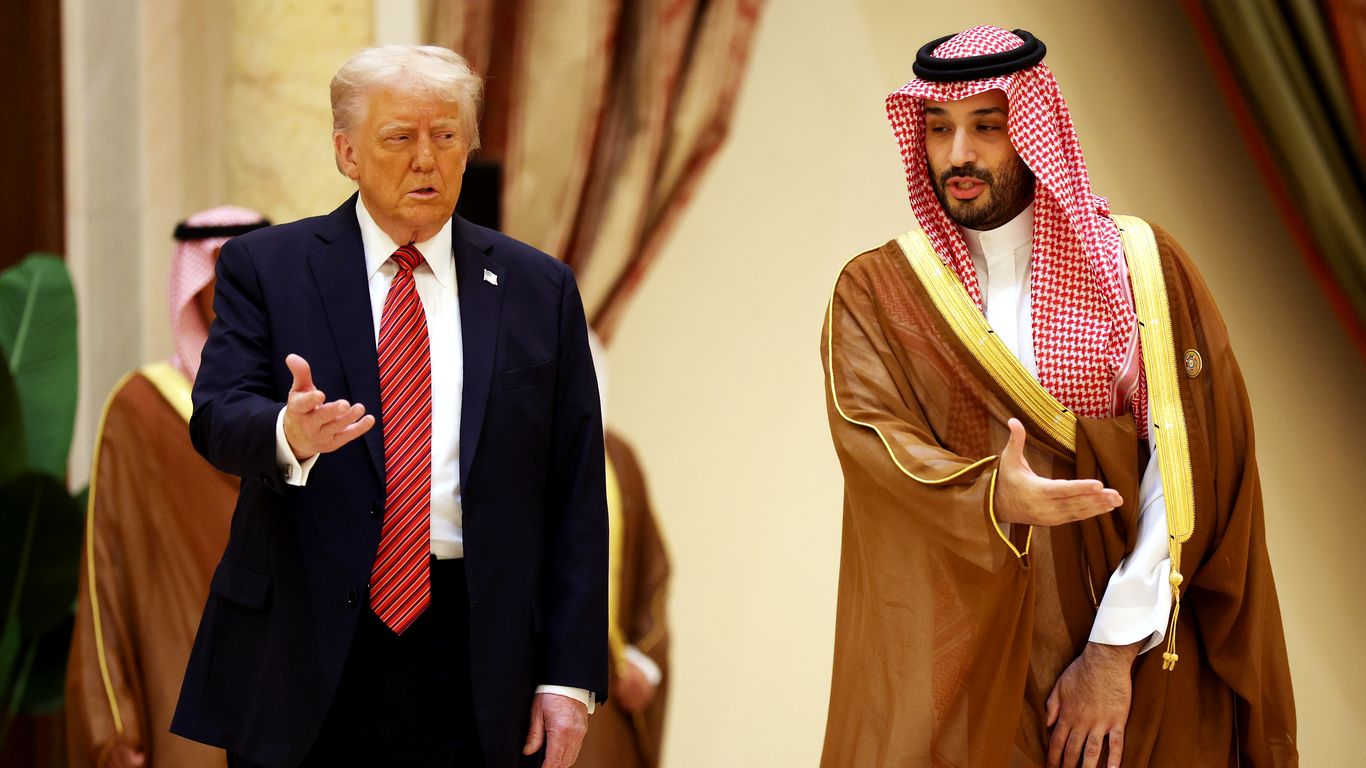Politics
Trump Expects Saudi Arabia to Normalize Relations with Israel

Former President Donald Trump communicated to Saudi Crown Prince Mohammed bin Salman (MBS) that he anticipates Saudi Arabia will move towards normalizing relations with Israel following the conclusion of the recent conflict in Gaza. This information was confirmed by two U.S. officials who spoke to Axios about the private phone call that occurred last month.
The significance of this potential shift in relations is underscored by U.S. officials, who have indicated they hope for tangible progress on normalization during MBS’s scheduled meeting with Trump at the White House next week. While there is optimism, the officials acknowledged that considerable differences remain between the Saudis and Israelis, which could complicate efforts.
Behind the Scenes of the Call
The conversation between Trump and MBS, which had not been publicly disclosed prior to this report, took place after a peace summit held in Egypt aimed at addressing the Gaza conflict. According to a U.S. official familiar with the discussion, Trump expressed that he had successfully facilitated a ceasefire in Gaza and urged MBS to take steps towards normalization with Israel. The Crown Prince reportedly expressed his willingness to collaborate with the Trump administration on this issue.
Despite the Crown Prince’s openness, the Saudi embassy in Washington did not respond to requests for comments regarding the call. The end of the Gaza conflict serves as one major hurdle removed from the normalization process, yet it is not the only barrier that remains.
Challenges and Conditions for Normalization
Alongside the cessation of hostilities in Gaza, U.S. officials contend that some of the Saudi conditions for normalization are nearing fulfillment. One of the primary demands from Saudi Arabia is a defense pact with the United States, and they are expected to secure a security commitment from Trump during MBS’s visit. While this agreement may not constitute a formal defense treaty, it could lay the groundwork for future security arrangements.
Additionally, Saudi Arabia seeks a clear and irreversible pathway to establishing a Palestinian state as part of any normalization agreement. The White House believes that the final components of Trump’s Gaza peace plan could align with these aspirations, potentially paving the way for renewed discussions on Palestinian statehood.
Israeli Prime Minister Benjamin Netanyahu, however, remains a significant obstacle in this process. He has publicly opposed the two-state solution and has taken a firm stance against implementing aspects of Trump’s peace plan, actions that U.S. officials have deemed unhelpful. Trump’s advisors are now encouraging Netanyahu to consider the broader implications of his actions, suggesting that supporting the peace plan could facilitate a historic agreement with Saudi Arabia.
The Trump administration’s proposal suggests that if the Palestinian Authority demonstrates genuine reform during Gaza’s reconstruction, it may create conditions amenable to Palestinian self-determination and statehood—goals recognized as essential by the Palestinian people. Yet, former U.S. officials and Arab diplomats express skepticism, arguing that the language of the plan may not adequately satisfy Saudi expectations for a “credible, irreversible, and time-bound path” toward statehood.
One former U.S. official, familiar with Saudi leadership perspectives, indicated that MBS requires more robust commitments from Israel, including concrete steps on the ground, to effectively communicate the benefits of normalization to the Saudi public. Public sentiment in Saudi Arabia has shifted, becoming increasingly anti-Israeli during the Gaza conflict, adding pressure on MBS.
A senior U.S. official summarized the situation, stating, “Our message to the Saudis is: ‘We did all the things you asked for. Now, there are things President Trump wants, like normalization with Israel. So how are you guys going to move now in this direction?'”
In recent developments, Netanyahu has entrusted the normalization discussions to his close advisor Ron Dermer, who will continue as a special envoy despite resigning from his ministerial position. During a recent visit to Washington, Dermer conveyed to Vice President Vance and Secretary of State Marco Rubio that he would persist in his efforts regarding potential agreements with both Syria and Saudi Arabia.
As the discussions progress, U.S. officials remain cautiously optimistic, although they acknowledge uncertainty regarding whether a breakthrough on normalization can be achieved during MBS’s upcoming visit to Washington.
-

 Top Stories3 weeks ago
Top Stories3 weeks agoMarc Buoniconti’s Legacy: 40 Years Later, Lives Transformed
-

 Health3 weeks ago
Health3 weeks agoInnovative Surgery Restores Confidence for Breast Cancer Patients
-

 Business2 weeks ago
Business2 weeks agoForeign Inflows into Japan Stocks Surge to ¥1.34 Trillion
-

 Sports4 weeks ago
Sports4 weeks agoSteve Kerr Supports Jonathan Kuminga After Ejection in Preseason Game
-

 Top Stories3 weeks ago
Top Stories3 weeks agoBOYNEXTDOOR’s Jaehyun Faces Backlash Amid BTS-TWICE Controversy
-

 Science4 weeks ago
Science4 weeks agoChicago’s Viral ‘Rat Hole’ Likely Created by Squirrel, Study Reveals
-

 Entertainment4 weeks ago
Entertainment4 weeks agoZoe Saldana Advocates for James Cameron’s Avatar Documentary
-

 Lifestyle4 weeks ago
Lifestyle4 weeks agoKelsea Ballerini Launches ‘Burn the Baggage’ Candle with Ranger Station
-

 Politics4 weeks ago
Politics4 weeks agoDallin H. Oaks Assumes Leadership of Latter-day Saints Church
-

 Science2 weeks ago
Science2 weeks agoUniversity of Hawaiʻi Joins $25.6M AI Project to Monitor Disasters
-

 Business4 weeks ago
Business4 weeks agoTyler Technologies Set to Reveal Q3 2025 Earnings on October 22
-

 Health3 weeks ago
Health3 weeks ago13-Year-Old Hospitalized After Swallowing 100 Magnets









